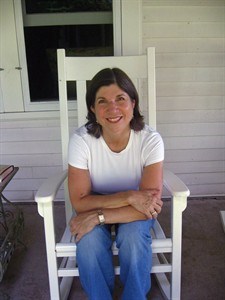
Author Anna Quindlen is shown in a handout photo. Quindlen likes being in her 50s - it's when she learned to stand on her head. It took the journalist and novelist two years to master the skill, something she couldn't do as a youngster. Now, facing 60, she can do it ???at a moment's notice,??? Quindlen brags in her recent memoir, ???Lots of Candles, Plenty of Cake.???THE CANADIAN PRESS/HO-Random House of Canada-Maria Krovatin
June 20, 2012 - 1:56 PM
TORONTO - Anna Quindlen likes being in her 50s — it's when she learned to stand on her head.
It took the journalist and novelist two years to master the skill, something she couldn't do as a youngster. Now, facing 60, she can do it "at a moment's notice," Quindlen brags in her recent memoir, "Lots of Candles, Plenty of Cake."
She did not demonstrate the skill during a recent interview, but we believe her. Quindlen has built a career, and earned a Pulitzer Prize, by sharing the everyday elements of her life in such a believable way that thousands of baby-boomer women have felt like she was inside their heads.
Beginning with the "Life in the 30s" column that she wrote for the New York Times 25 years ago, Quindlen's non-fiction writing (she is also the author of six novels) has focused on raising children, building a career and staying married, all from a feminist perspective.
She is disarmingly honest in her writing, from little details — what she has in her closet — to big issues, such as why she has split from the Catholic Church. Her husband once complained, "Could you get up and get me a beer without writing about it?"
The journalist has now turned her attention to the intricacies of life as a "senior," although she admits, with a laugh, that she has sympathy for the view that baby boomers are acting like they are the first generation to grow old.
"We also acted like we were the first generation to raise children," she says.
But she justifies her focus with the fact that boomers' experience of aging will be much different than their parents because they will be living much longer. "My generation has an entire stage of life that previous generations didn't have."
The loss of her mother to cancer when she was 19 has shaded Quindlen's perspective and work. At the time, she consoled herself by thinking that at least her mother, who was 41 when she died, got to live out much of her life.
"Then I got older myself and realized, no, she died at such a young age."
This realization was an impetus behind her memoir, which she says came about "by happenstance."
Quindlen ran across a statistic that, in the year of her birth, people lived to an average age of 68. She was shocked at that young age and began to ponder the myriad issues that have arisen as people live longer.
Then, she was alone at her family home in Pennsylvania when a tornado struck. She sent emails to her three children to say she was OK and her youngest, Maria, called, crying, afraid that she too might have lost her mother, as Quindlen did, at a young age.
"I responded, Oh, honey, I'm too old to die young," says Quindlen.
She thought it would be interesting to explore the phenomenon of what has become an extremely long retirement and aging period in the lives of most — and which brings with it a whole new industry.
"Assisted-living facilities did not exist for previous generations," she says. "Assisted living was when grandma came to live with her daughter."
Quindlen does not deal with any catastrophic challenges that many people face in their aging years, such as poverty or serious illness. Her view of aging, from her perch as a financially stable, healthy, educated, long-married — and still working — mother with a city house and a country house —represents only a tiny fraction of people her age.
A review in her former newspaper, the New York Times, describes "her mulling over what might be termed White People Problems."
She writes about the importance of girlfriends, how white lies can smooth a marriage; the changes in women's underwear; and why her grown children still can't put a cereal bowl in the dishwasher. Nice problems to have, certainly.
Quindlen acknowledges that she often gets criticized for being too optimistic. But she makes no apologies, and thinks she is not alone, citing a poll that shows happiness levels start to climb after people leave their 30s and 40s, largely because they have more time for themselves.
The most surprising thing, she says, is "how good things are and how happy I am in my family life, my marriage and my work life."
"I am also surprised that I can still learn to do new things, like stand on my head."
News from © The Canadian Press, 2012